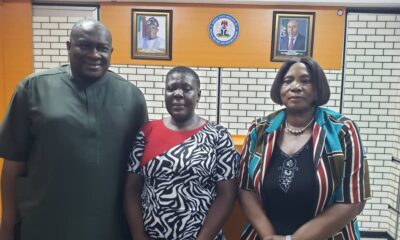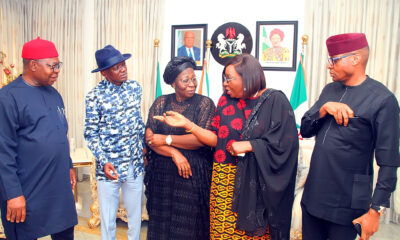Business
Nigeria’s Trade Costs Too High To Attract Investments, WTO DG Laments
The Director General of the World Trade Organization (WTO), Dr Ngozi Okonjo-Iweala, has told President Muhammadu Buhari, ministers and other top government officials that Nigeria’s trade costs are too high.
Okonjo-Iweala, who was a former Minister of Finance and Coordinating Minister of Economy under the administration of former President Goodluck Jonathan, stated this via a video link on the second day of the Mid-term Ministerial Performance Review at the Presidential Villa, Abuja, yesterday.
She further spoke of the need to improve the nation’s security in order to attract foreign and domestic investments.
The WTO DG said the country must cut down not only on trade cost but also infrastructure cost, linkage cost, regulatory cost, customs cost, and all costs associated with moving goods from the factory to the final consumer to complement investment facilitation.
She pointed out that Nigeria’s trade cost was equivalent to 306 per cent tariff, one and half times higher than the cost in high-income countries.
According to her, congestion, capacity constraints and high costs at Nigerian ports do not encourage investment as they make it difficult to build supply chain operations in the country.
She said: “Improving security and lowering transaction cost for foreign investment, even for domestic investment, would be necessary. And Nigeria is part of a group of countries negotiating an agreement on investment facilitation at the WTO.
“Once this agreement is negotiated, ratified and is being implemented, it could be instrumental in attracting additional trade-oriented investment.
“To complement investment facilitation, Nigeria has to cut down on trade cost, infrastructure cost, linkage cost, regulatory cost, customs cost, basically, all costs associated with moving goods from tie factory or farm gate to the final consumer.
“Nigeria’s trade costs are too high. According to the World Bank-ESCAP trade costs for 2019, trade costs for African countries are on average equivalent of a 304% tariff and for Nigeria, it’s even slightly higher at 306%.
“These numbers are one and half times higher than trade cost in high-income countries. Such high costs are not conducive to forming regional value chain.
“Congestion, capacity constraints and high costs in our ports make life difficult for anyone seeking to build supply chain operations in Nigeria and hence, expand trade from there.”
Business
Expert Tasks Government On Civil Maritime Security Unit
Business
Bayelsa Recommits To Infrastructure, Sectoral Dev … Rakes In N227.185b From IGR
Business
NDYC Seeks NDDC Commercialisation … Uncompleted Projects Completion
-
Business2 days ago
NDYC Seeks NDDC Commercialisation … Uncompleted Projects Completion
-

 Rivers2 days ago
Rivers2 days agoCommissioner Promises Improved Working Conditions … Splashes N.1m On Outstanding Caregiver
-
Sports2 days ago
Sports: 2nd Edition Of Inter-Tribal Tourney Kick-starts In Mbiama
-
Niger Delta2 days ago
NACAT Inaugurates South-South Office In A’Ibom Against Corruption
-
Sports2 days ago
AFCON: Eguavoen, Emenike predict S’ Eagles’ chances
-
Business2 days ago
Bayelsa Recommits To Infrastructure, Sectoral Dev … Rakes In N227.185b From IGR
-

 News2 days ago
News2 days agoS’South Deputy Govs Pay Condolence Visit To A’Ibom Colleague
-

 Niger Delta2 days ago
Niger Delta2 days agoHYPREP Presents Scholarship Grants To 300 Ogoni Postgraduate Students

